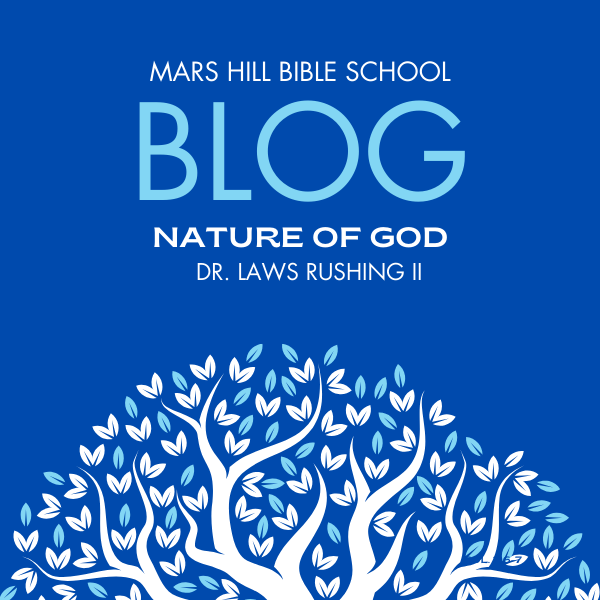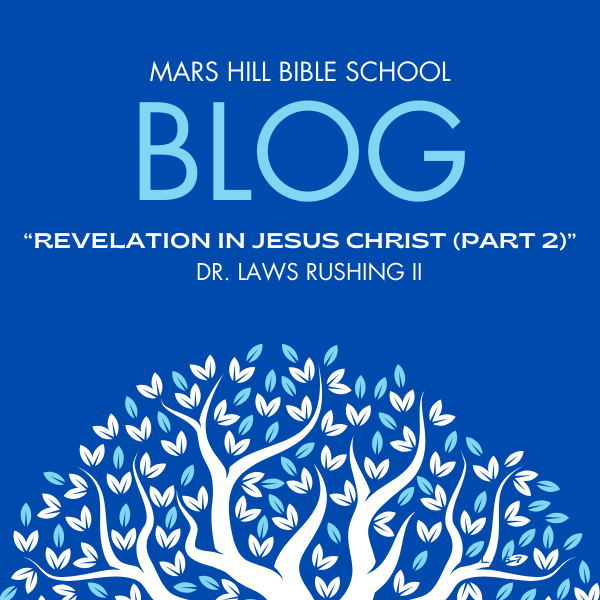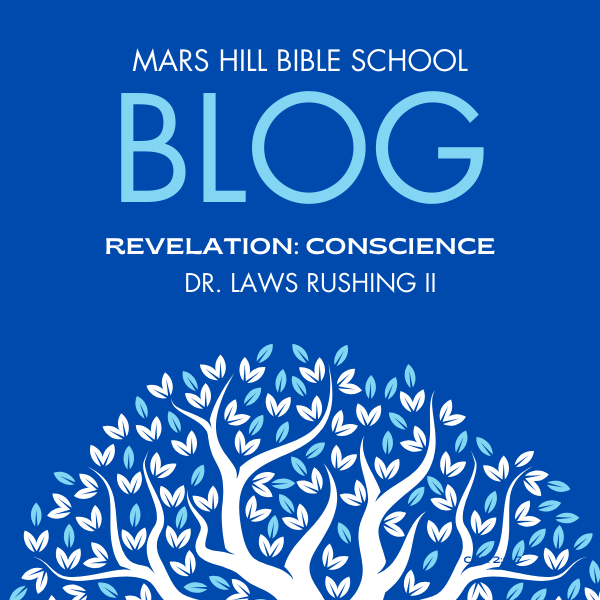MHBS Blog
Nature of God

“Who hath delivered us from the power of darkness, and hath translated us into the kingdom of his dear Son: In whom we have redemption through his blood, even the forgiveness of sins: Who is the image of the invisible God, the firstborn of every creature: For by him were all things created, that are in heaven, and that are in earth, visible and invisible, whether they be thrones, or dominions, or principalities, or powers: all things were created by him, and for him: And he is before all things, and by him all things consist. And he is the head of the body, the church: who is the beginning, the firstborn from the dead; that in all things he might have the preeminence. For it pleased the Father that in him should all fulness dwell”
The Bible is the record of God revealing Himself through the person and work of Jesus Christ. Colossians says that Jesus is the “image of the invisible God” and “for in Christ all the fullness of the Deity lives in bodily form.” However, we must understand the gravity and consequence of speaking about God. The Ten Commandments memorably decree, “Thou shalt not take the name of the Lord thy God in vain” (Exodus 20:7).
A. W. Tozer further explains,
What comes into our minds when we think about God is the most important thing about us. The history of mankind will probably show that no people has ever risen above its religion, and man’s spiritual history will positively demonstrate that no religion has ever been greater than its idea of God. Worship is pure or base as the worshiper entertains high or low thoughts of God.
For this reason, the gravest question before the Church is always God Himself, and the most portentous fact about any man is not what he at a given time may say or do, but what he in his deep heart conceives God to be like. (Tozer 1978)
The great Spurgeon eloquently preached on the nature of God,
The highest science, the loftiest speculation, the mightiest philosophy, which can ever engage the attention of a child of God, is the name, the nature, the person, the work, the doings, and the existence of the great God whom he calls his Father. There is something exceedingly improving to the mind in a contemplation of the Divinity. It is a subject so vast, that all our thoughts are lost in its immensity; so deep, that our pride is drowned in its infinity. Other subjects we can compass and grapple with; in them we feel a kind of self-content, and go our way with the thought, “Behold I am wise.” But when we come to this master-science, finding that our plumb-line cannot sound its depth, and that our eagle eye cannot see its height, we turn away with the thought, that vain man would be wise, but he is like a wild ass’s colt; and with the solemn exclamation, “I am but of yesterday, and know nothing.” No subject of contemplation will tend more to humble the mind, than thoughts of God. We shall be obliged to feel—“Great God, how infinite art thou, What worthless worms are we!” (Spurgeon 1855)
There is a temptation to put God “in our box” or to create a mental idol, so it is imperative to strive for biblical understanding, rationally, and spiritually. We must strive for thoughts worthy of God’s magnitude and grandeur. We must cast down anything that competes for the place of God and His will. The Apostle Paul reminds, “casting down arguments and every high thing that exalts itself against the knowledge of God, bringing every thought into captivity to the obedience of Christ” (II Corinthians 10:5).
The Prophet Isaiah prepares hearts and minds to meditate on our Sovereign God.
“Have you not known? Have you not heard?
The Lord is the everlasting God,
the Creator of the ends of the earth.
He does not faint or grow weary;
his understanding is unsearchable.
He gives power to the faint,
and to him who has no might he increases strength.
Even youths shall faint and be weary,
and young men shall fall exhausted;
but they who wait for the Lord shall renew their strength;
they shall mount up with wings like eagles;
they shall run and not be weary;
they shall walk and not faint.
Fear Not, for I Am with You”
Revelation in Jesus Christ (Part II)

As previously discussed, the entire Bible is the revelation of Jesus Christ and identifies itself as the inspired Word of God. “All Scripture is given by inspiration of God, and is profitable for doctrine, for reproof, for correction, for instruction in righteousness, that the man of God may be complete, thoroughly equipped for every good work” (II Timothy 3:16,17). Furthermore, “holy men of God spoke as they were moved by the Holy Spirit” (II Peter 1:21). The origin of Scripture is almighty God. The Greek word for “inspiration” literally means “God breathed.”
Jesus always affirmed the authority of Scripture in His earthly ministry. This was in contradistinction with rabbis of His day who placed the emphasis on oral tradition. Jesus gave a familiar refrain strongly advocating Scripture, “Have you not read?” (Matthew 12:3,5; 19:4; 21:16; 21:42; 22:31)(Mark 2:25; 12:10; 12:26)(Luke 6:3). Jesus’ resounding use of Old Testament Scripture not only supports its divine origin but also its historicity. His sermons were filled with references to Old Testament characters, such as Eden’s first couple, Noah, Abraham, Moses, David, Jonah and places like Sodom. Jesus reminded his listeners, “For assuredly, I say to you, till heaven and earth pass away, one jot or one tittle will by no means pass from the law till all is fulfilled” (Matthew 5:18).
The Bible is a supernatural book and manifest attributes unseen in books of solely human origin. The Bible’s great continuity over many centuries, through several languages, with dozens of authors is an amazing demonstration of God’s inspiration alive on the pages. Its many stories, teachings, poetry, and wisdom give a comprehensive and cohesive vision of humanity’s spiritual need of redemption.
The Scriptures also reveal the confirmation of God’s message through miraculous deeds and events. The purpose of miracles was to substantiate the proclamations of God’s messengers. Mark reveals, “And they went out and preached everywhere, the Lord working with them and confirming the word through the accompanying signs” (Mark. 16:20). Moreover, “God also bearing witness both with signs and wonders, with various miracles, and gifts of the Holy Spirit, according to His own will? (Hebrews 2:4) God promised Moses that his leadership and prophetic voice would be aided by God’s intervening acts, “Then it will be, if they do not believe you, nor heed the message of the first sign, that they may believe the message of the latter sign” (Exodus 4:8). Jesus and His apostles were recognized as messengers of God because of their miraculous deeds wrought through the Holy Spirit (Acts 2:22, 43). The Biblical zenith of miraculous activity is the life of Jesus. No other Biblical character displays the grand scope, frequency, and staggering power of our Lord with His inevitable triumphant resurrection.
The Bible also showcases God’s handiwork through the prophetic writings. God is sovereign over time and not bound by its constraints. The prophets were able to accurately predict events, people, outcomes that were in dark distant centuries. R.S. Foster remarks on the uniqueness of the Bible’s prophetic faculty, “No well-accredited prophecy is found in any other book or even oral tradition now extant, or that has ever been extant in the world. The oracles of heathenism are not to be classed as exceptions. There is not a single one of them that meets the tests required to prove supernatural agency, which every Scripture prophecy envices.” (Foster 1923) We also need to understand that prophecy is bifurcated between unconditioned and conditioned. The conditional prophecies were reliant on human activity such as Israel’s fidelity to Yahweh.
Just as God’s supernatural activity is crowned in Jesus’ life through myriads of powerful miracles, so it is also with prophecy. Here is just a sample of the hundreds of prophecies concerning Jesus, fulfilled in his day: birthplace (Micah 5:2), descendent of David (II Samuel 7:12), crucifixion and burial (Psalms 22, Isaiah 53), resurrection (Psalms 16:10). These prophecies and many more authenticate the Bible as more than a book of human invention but of divine origin.
The teachings of Jesus also reveal a supernatural character. His preaching was astonishingly authoritative and identifies Himself over the Torah. In the Sermon on the Mount, Jesus emphatically says, “But I say unto you,” while referring to the law. Jesus declares of Himself, “Lord of the Sabbath” and before Abraham was, “I Am” (Matthew 5: 22, Luke 6:1-5, John 8:48- 59). The sublime ethics of Christ exceeds behavior and confronts the very heart of humanity for transformation. Jesus’ teachings on the inner life such as hate, lust, love, and forgiveness are matchless, and love is even extended to enemies! The exalted teachings are counter to perennial culture and what comes natural to any of us, thus divine.
The Bible has endured through the centuries despite violence and the highest scrutiny. It has not just survived but has amazing relevance for every generation. It answers the deepest questions and gives hopeful consolation to our most painful struggles. It consistently is the most sold book every year and billions have been printed. Jesus was right once again when He said, “Heaven and earth shall pass away, but my words shall not pass away.” (Matthew 24:35).
Revelation in Jesus Christ (Part I)

God has revealed Himself to humanity externally through His relationship as Creator. We can begin to know Him rationally because of the quality of reality itself. There are many natural evidences such as a beginning to the universe, the pervasive hallmarks of amazing design, and the contingent nature of being itself. All of these evidences can be explored through the work of many philosophers like Aristotle, Thomas Aquinas, Richard Swinburne, William Lane Craig, and Alvin Plantinga among many others. God has also revealed Himself internally through the conscience which points to man’s spiritual nature because of free will and the realization of objective moral values. These facts help us begin to know God’s existence and His essential character but only partially and even in a mysterious sense.
However, God has completely, categorically, and unequivocally revealed Himself in the person and work of Jesus of Nazareth.
The Scriptures state, “God, who at various times and in various ways spoke in time past to the fathers by the prophets, has in these last days spoken to us by His Son, whom He has appointed heir of all things, through whom also He made the worlds; who being the brightness of His glory and the express image of His person, and upholding all things by the word of His power, when He had by Himself purged our sins, sat down at the right hand of the Majesty on high, having become so much better than the angels, as He has by inheritance obtained a more excellent name than they” (Hebrews 1:1-4). God has authoritatively spoken through His Son who is the “express image of His person.”
The revelation of Jesus Christ gives humanity understanding of God because He is God and Jesus is the very centerpiece of all Holy Scripture. The Scriptures are either written in prophetic anticipation, direct apostolic witness, or about the will of the Lord Jesus. We cannot mistake the divine purpose of the entire Bible which is to manifest Yahweh to humanity in Jesus through the Holy Spirit.
The Torah is written to begin the sketch outline of Jesus and His holiness. In fact, Jesus said, “For if you believed Moses, you would believe Me; for he wrote about Me. But if you do not believe his writings, how will you believe My words?” (John 5: 46) The Torah is fulfilled in the life and ministry of Jesus. (Matthew 5:17) “Do not think that I came to destroy the Law or the Prophets. I did not come to destroy but to fulfill.” The law had several divine purposes, but the primary one was to find vivified perfection in the person of Christ. The work of Christ’s vicarious death is inextricably joined to His superintendence and subservience to the law in life. It is through His absolute righteousness that our atonement from sin can be accomplished.
The law was initiated to bring humanity to Christ and thus salvation. It is a preparatory means for humanity to apprehend and appreciate the Messiah Jesus. The Scriptures state, “Therefore the law was our tutor to bring us to Christ, that we might be justified by faith. But after faith has come, we are no longer under a tutor” (Galatians 3:24). Moreover, The Hebrew writer states, “For the law, having a shadow of the good things to come, and not the very image of the things” (Hebrews 10:1). Jesus taught His disciples from the Old Testament regarding Himself, “And beginning at Moses and all the Prophets, He expounded to them in all the Scriptures the things concerning Himself” (Luke 24: 27).
The Gospels present the faithful testimony of the earthly life and teachings of Jesus of Nazareth. The four biographies detail the miraculous virgin birth, dramatic baptism by the prophet John, the unparallel ministry of Jesus, vicarious death and victorious resurrection. The evangelist Luke even details his historical methodology in his prologue to the eponymous Gospel, “Inasmuch as many have taken in hand to set in order a narrative of those things which have been fulfilled among us, just as those who from the beginning were eyewitnesses and ministers of the word delivered them to us, it seemed good to me also, having had perfect understanding of all things from the very first, to write to you an orderly account, most excellent Theophilus, that you may know the certainty of those things in which you were instructed” (Luke 1:1-4). Luke explains that his account was from “eyewitnesses” and written for the specified purpose of giving an “orderly account.”
The epistles are a continuation of Jesus’ teaching through the first century apostolic voices. Jesus promised, “I still have many things to say to you, but you cannot bear them now. However, when He, the Spirit of truth, has come, He will guide you into all truth; for He will not speak on His own authority, but whatever He hears He will speak; and He will tell you things to come” (John 16: 12,13). The Holy Spirit came on the day of Pentecost and further instructed the apostles and the church (Acts 2:1-4). The Apostle Paul explicitly proclaims, “For I neither received it from man, nor was I taught it, but it came through the revelation of Jesus Christ.” The Holy Scriptures are undoubtedly the revelation of God in Jesus Christ.
Revelation: Conscience

God has revealed himself externally through creation with the amazing characteristics of design, purpose, and beauty found in the universe. The telos of the universe from its initial conditions to the current state are balanced on a razor’s edge of unimaginable precision and impossible likelihood if due to mere chance or necessity.
God has not only revealed himself through these means but also internal to man himself. This is what C.S. Lewis called “inside information.” When we peer within our minds- we find a conscience, an awareness of moral considerations within human behavior. The question posed then becomes is this moral “oughtness” objectively true or merely illusory.
The Apostle Paul wrote, “for when Gentiles, who do not have the law, by nature do the things in the law, these, although not having the law, are a law to themselves, who show the work of the law written in their hearts, their conscience also bearing witness, and between themselves their thoughts accusing or else excusing them)“ (Romans 2:15,16). There is an inner “law written in their hearts.” It is innate and active in every person. The conscience is an instrument calibrated through experience, education, influence, and the Holy Spirit. Our consciences can be maladapted and damaged through spiritual trauma and recurrent sin (I Timothy 4:2).
The inner life of the conscience reveals that we are created with free will. Other entities in the universe are motivated by instinct or physical law. People have the liberty to adjudicate choices based on virtue and consequence rather than only bodily impulses. This is another trademark of man’s spiritual nature that does not consist of just physical or material constituents.
A committed and consistent materialist has no place for genuine free will in an atheistic framework. People become the product of biology and chemical reactions with no real choice. Renowned atheist Sam Harris states, “Free will is an illusion. Our wills are simply not of our own making. Thoughts and intentions emerge from background causes of which we are unaware and over which we have exert no conscious control” (Harris 2012).
Harris’ assertion argues with everything within our experience. His bold claims are mostly supported by a scant reference to the controversial Libet experiments from the 80’s. It’s not empirical information or common sense but an atheistic worldview which drives his dehumanizing conclusion. There is simply no room for freedom. Yet, the brilliant Harris can’t seem to see the painful irony of freewill being fundamental to rationality itself in which his entire argument and book are predicated on not to mention psychology, social science, morality, justice, and love, just to name a few!
Our consciences are structured on the foundation of free will or human agency and on another fact, objective moral truths. Not only does free will dissolve in the atheistic worldview but also morality itself. This has been admitted by such philosophers as Sartre, Nietzsche, and evolutionary biologist Richard Dawkins. If there is no transcendent value in the universe then our morality is vastly reduced to just individual preferences. Dawkins observed, “The universe we observe has precisely the properties we should expect if there is, at bottom, no design, no purpose, no evil, no good, nothing but blind, pitiless indifference.” This view of life is untenable and unlivable and once again argues with the conscience that God has instilled in every human being.
God has revealed Himself as Creator through external evidence in the universe and internally through the conscience of an individual. Conscience is predicated on free will and objective moral truths. These ubiquitous foundational truths are what make us truly human and have the capacity to begin to know Him.


.png)
